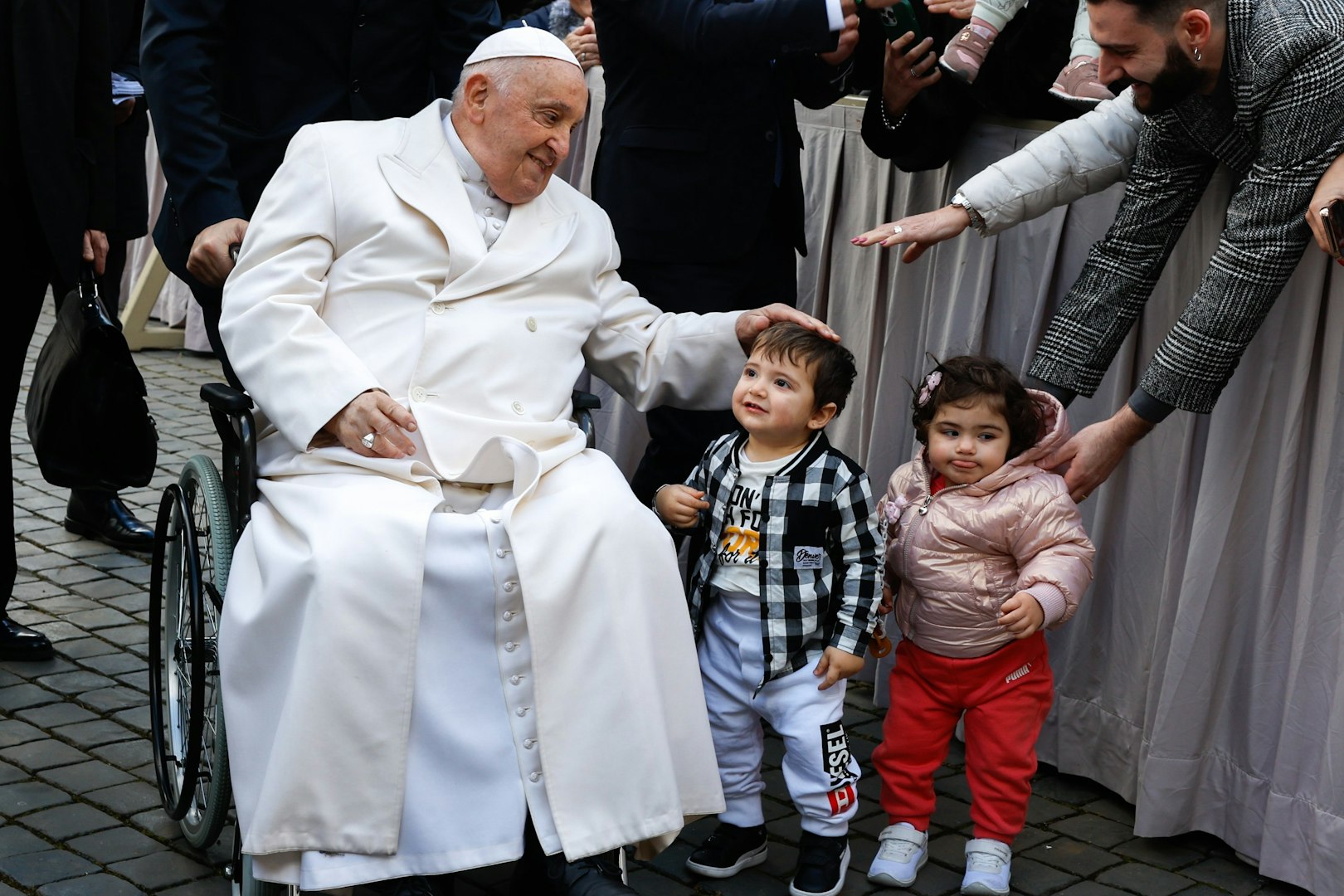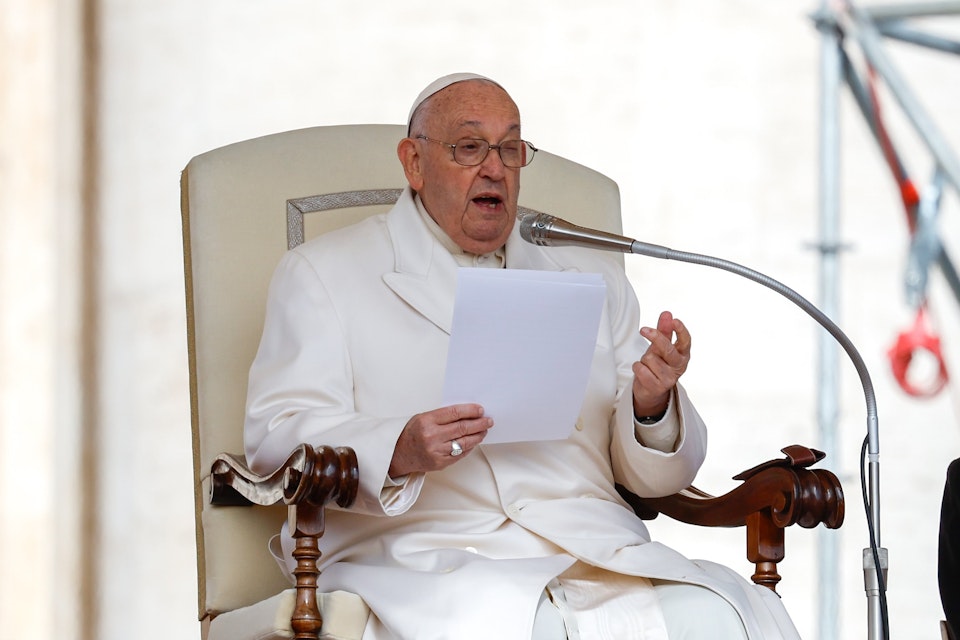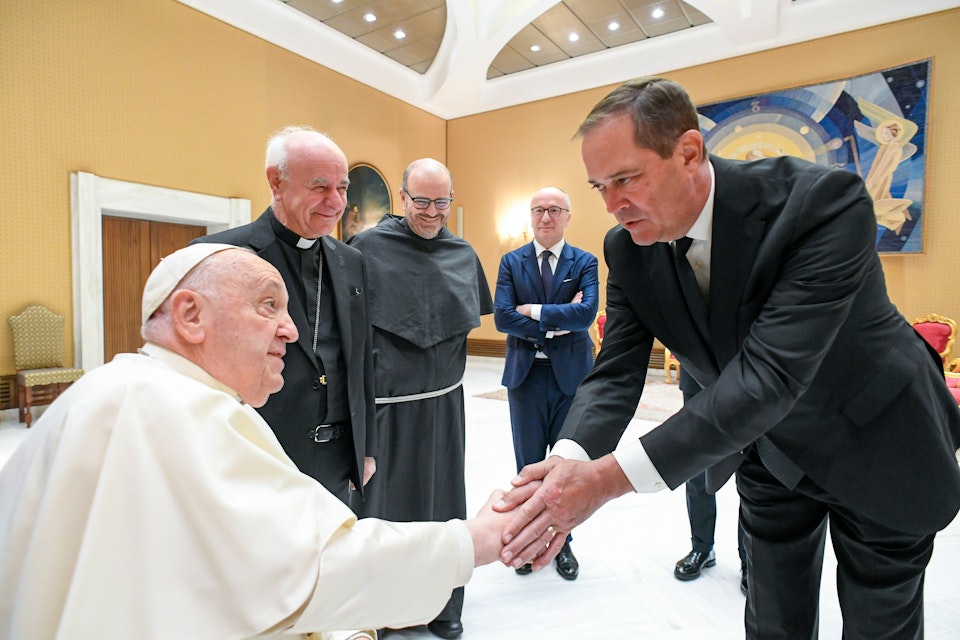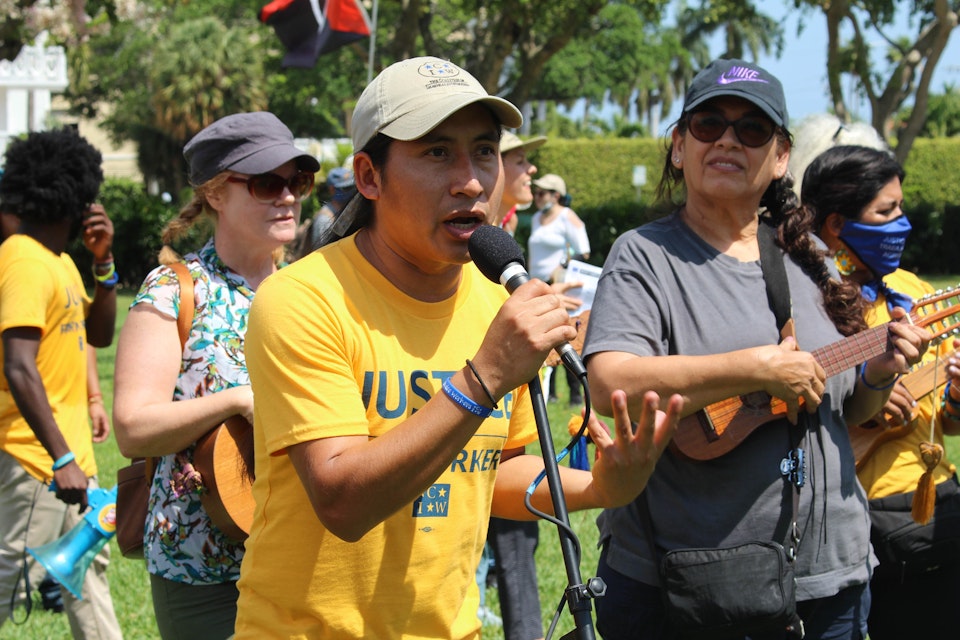While some might view religious life as a renunciation of the world, for these young sisters, it’s an opportunity to live authentically
DETROIT — When a young woman becomes a religious sister, she commits her life to God, taking vows of poverty, chastity and obedience.
It’s well known what she’ll be giving up to do so — marriage, and the option to have children of her own, for one. A renunciation of the modern way of life, a religious sister also gives up material comforts, owning everything in common with her religious community.
But a religious vocation involves another hidden sacrifice — saying goodbye to a relationship with one’s parents and family as one knows it.
On paper, there are many reasons this countercultural choice might not seem like a good idea. But talk to any sister and her biological family, and it’s clear that the moment she says “yes” to a vocation as a bride of Christ, much is gained — not only for her, but those close to her.
Growing up in a small town in Indiana as one of three children, Sr. Irenaeus Schluttenhofer, OP, was committed to her faith, but the thought of religious life was never commonplace in her family. She always assumed she was going to be a wife and mother.
Part of a religious vocation is taking on a new identity in Christ, said Sr. Irenaeus, who along with another sister interviewed for this article requested Detroit Catholic omit her given name for this reason.
As a teen, Sr. Irenaeus said her “life was beautiful,” full of wonderful activities and friends, but deep in her heart, she had a sense that God had something more for her.
While a freshman at Purdue University studying agriculture, she was invited to attend a retreat with the Dominican Sisters of Mary, Mother of the Eucharist, in Ann Arbor.
“I met the sisters, and I saw their joy and I saw their authentic love for the Lord,” Sr. Irenaeus said. “I realized that was kind of the peace I had been missing; while I had always done all the things that were absolutely required to live the faith, I didn't know Him.”

While studying agriculture at Purdue University, the future Sr. Irenaeus Schluttenhofer, OP, was invited to attend a retreat with the Dominican Sisters of Mary, Mother of the Eucharist, in Ann Arbor, where she was drawn to their joy and authentic love for the Lord. (Photo courtesy of Mike Schluttenhofer)
Returning to campus, she became involved at St. Thomas Aquinas, the Catholic center on campus run by Dominican friars. Through their example, she again observed the same authenticity she had seen in the sisters.
“I think young people long for something real. They long for something that will draw them out of themselves. They long to give themselves totally,” Sr. Irenaeus said. “And I saw that lived in the Dominican order. It was becoming more and more attractive, but I still wasn’t sure it was for me.”
She returned again to the motherhouse for another retreat during her junior year, and it was during an all-night Eucharistic adoration that she felt Christ was not only calling her, but he had made a place for her in the community of sisters.
“I definitely did have fear — fear of the unknown, fear of giving things up — but as time went on, and as (Jesus) started to draw me closer and closer into His heart, the little things started to be less important,” Sr. Irenaeus said.
Christ wasn’t calling her to sacrifice her life, she realized. Rather, he had made her heart for this life.
“Those other things had started to fade away, and they weren’t what I wanted,” Sr. Irenaeus said. “In the first letter of St. John, it says, ‘perfect love casts out fear.’ I wouldn’t say my love is perfect — there is still some degree of fear at times. But the more we love, the more fear takes a backseat. It doesn’t drive our decisions.”
Sr. Irenaeus entered the community in 2012. Prior to entering, on the day after asking for her application, she met her parents for lunch and shared the news.
Mike and Roberta Schluttenhofer, who have been married for 37 years, said they watched their daughter embrace and grow in her faith over time, starting in high school and continuing into college.
While the news wasn’t a shock to them –– they had watched Sr. Irenaeus return over and over again to the motherhouse in Ann Arbor –– the prospect of not being able to see and communicate with their daughter as regularly was initially daunting.

“I guess the hardest thing for me was, we were a very close family. We did a lot of stuff together,” Roberta said. “I thought, ‘Well, she won’t be there at Christmas and holidays and stuff.’ So that was a little hard to adjust to.’”
Sr. Irenaeus said the family is still close and loves one another, but just as a bride who leaves her family to follow her husband and start a family of her own learns to love her family in a whole new way, so it is when entering religious life, becoming a bride of Christ with a whole new family of sisters.
“I think, across the board, it is oftentimes a harder adjustment for our parents than it is for us because we know why we’re doing what we’re doing — that we’re giving things up for love of someone,” Sr. Irenaeus said. “We’re making these changes for the love of someone, someone who’s called us, who has invited us into a deep and personal love.”
Now, when Sr. Irenaeus and her parents talk on the phone and visit in person, they focus on the deeper important topics, making the most of their shortened time to communicate.
Gaining a big family
While the Schluttenhofers knew some nuns and even had some in their extended family, by the time they came around to raising their own children, nuns were no longer a staple at Catholic parishes and schools.

Interest in religious life has declined steadily since the mid-20th century, when religious accounted for 90 percent of Catholic school staff. According to the National Catholic Educational Association, today, they account for only 3 percent.
The number of sisters has steadily declined in the United States, from 160,931 in 1970 to only 41,357 in 2020. While the number has fallen, anecdotally, people are reporting seeing a deluge of young millennial women being drawn to religious life, despite being less exposed to the example of religious life even within many Catholic families.
The expectation for most parents is that their children will grow up and have children of their own, not that they will leave their families and join a religious community, Mike Schluttenhofer said. However, Mike and Roberta’s outlook changed as they saw how happy their daughter was.
“You could tell she just really loved what she was doing,” Roberta said. “So that really helped us to understand, too, that if you love something, just like any profession, it’s easy to pursue it.”
For Sr. Irenaeus, the natural instinct and expectation of motherhood also required a shift in perspective.

The number of sisters has steadily declined in the United States over the last half-century. While the numbers have fallen, anecdotally, more young millennial women are being drawn to religious life, despite being less exposed to the example of religious even within many Catholic families. (Detroit Catholic file photo)
“When I would envision my family, I would always envision a really big family, with lots of kids,” Sr. Irenaeus said. “And then, as I was feeling this call to religious life, I realized that even with the biggest biological family, I wanted to love even more. It became a realization that all of God’s children could truly be my children, that I could help them grow in grace, through my prayers, through sacrifices. It was realizing that I could live those things out, but in a different way, and in a deeper way.”
For their part, the Schluttenhofers gained more daughters than they could have imagined as a result of their daughter’s vocation. Sr. Iraneaus said when her parents come to visit, they bring food to give to the sisters.
“(They realized) they could love the sisters — all of the sisters, not just me — in the same way,” Sr. Irenaeus said. By extension, Sr. Irenaeus said her parents and others like them are participating in the mission, the sacrifices and the charism of the Dominicans.
Sr. Irenaeus took her final vows in July 2020. She said she and her fellow sisters live each day as an adventure as they explore their differences, their gifts and the way God brought them together to live a life of joyful laughter, friendship and the mission of their order.

“Sometimes we look at each other and say, ‘Never in my life would I have met you. I would never have gotten to know you, spent time with you, and now you’re someone who is walking with me to heaven. We can have beautiful, really enduring friendships,’” Sr. Irenaeus said.
When she made her perpetual profession, Sr. Irenaeus vowed that she would remain with her community throughout her lifetime.
“I’m going to be walking with them for all my life, to try to follow the Lord’s will,” she said. “We laugh so much, we play games, we enjoy ourselves. I’ve truly gained a family and friends. But the thing is, it wouldn’t work if we didn’t keep our eyes on Christ.”
Not losing an identity, but gaining one
Like Sr. Irenaeus, as a child, Sr. Maryja Czarna Madonna, SSVM, had never really considered religious life. Growing up in Troy with her parents and younger sister Lea Wojciechowski Ross, they attended St. Anastasia Parish.

Now, Sr. Maryja is a missionary sister of the institute Servants of the Lord and the Virgin of Matará. She entered the convent in 2007 at age of 20. After her initial period of formation in Washington, D.C., she was sent to Italy in 2010 to collaborate in the Cornelio Fabro Cultural Project, an apostolic work she continues today. She lives in Celleno, a small town in central Italy.
“I had a vague idea about religious sisters and the convent from what I knew about St. Faustina and St. Therese, but not much beyond that,” Sr. Maryja wrote to Detroit Catholic. “I didn’t really know about religious sisters or religious priests because I didn’t see them and I didn’t know anyone who talked about or knew about them. Religious life seemed like something from the past; I never considered that people still entered the convent.”
At the age of 15, Sr. Maryja was introduced to some lay consecrated men and women. Although she couldn’t place her finger on what attracted her to her vocation, she knows this encounter was a pivotal moment that led her to think about religious life.

Similar to Sr. Iraneaus, by the time Sr. Maryja had accepted her vocation, the distance and separation required of her from her family did not stand in the way of her path toward following her vocation.
“I didn’t find my new life particularly difficult because I knew I was following the path that God had prepared for me, and He gave me that strength and enthusiasm so common among novices,” Sr. Maryja said. “Religious life, by its very definition, entails separation from the world, which includes separation from family and friends. Religious are consecrated, or set apart, for the praise and service of God and, as a consequence, the service of neighbor.”
However, Sr. Maryja added, the founder of her congregation, Fr. Carlos Miguel Buela, considers contact with family very important, fitting into the community’s charism, which is evangelization — something that must begin with the sisters’ own families.
Having a religious sister in the family, even though it took some adjustment, allows her family an opportunity to grow in their faith, beyond simply going to Mass on Sunday, Sr. Maryja said.

“My family’s vision of the Church has expanded as they learn more about the missions, community, and evangelization from my experience as a missionary sister.” Sr. Maryja wrote. “They have also learned about the richness of diverse vocations within the Church and have deepened their understanding of their own vocation to marriage and family life.
“My family also greatly appreciates my prayers for them (as I am very grateful for their prayers for me); they’ve experienced the fact that spiritual bonds strengthen family ties, and that prayer unites us across time and space,” she added. “Even though we don’t talk on the phone or see each other as often as some other families, I’m closer with the members of my family than many families that live in the same town.”
Lea Wojciechowski Ross is two years younger than Sr. Maryja, and said she looked up to and enjoyed a very intellectual relationship with her sister, having deep conversations about life and theology as they grew up together.
Wojciechowski Ross said the experience of having a sibling join a religious order is often difficult for people to understand.

“I think sometimes people think of religious as overly contemplative, and she’s very active (in her community). She’s using her same talents and skills and personality that she had before,” Wojciechowski Ross said. “It’s not like she’s totally changed or completely dead to the world. She’s still herself, and she’s just complex. Something I’ve really enjoyed seeing is how she’s still using who she is, her God-given charisms and talents. It’s not like she had to stop being herself in order to be in religious life.”
Although part of a congregation with a charism of evangelization and service, Sr. Maryja said the most important part of religious life is the individual’s consecration.
“First and foremost, a religious sister is a Spouse of Christ and Mother of souls,” Sr. Maryja wrote. “Her personal relationship with Christ must be nourished by her participation at daily Mass and her life of prayer; her apostolic work is sustained by her spiritual life.”
Ultimately, Sr. Irenaeus said, the things that look like a renunciation to the world allow sisters to live with the freedom to keep their eyes on Christ.
“In order to live one’s vocation, God calls each person to holiness, and He’s made each individual heart in a particular way,” Sr. Irenaeus said. “It’s in living our vocation that we find how we’re meant to give ourselves to the world. And in that has been deeper joy than I ever could have imagined.”










